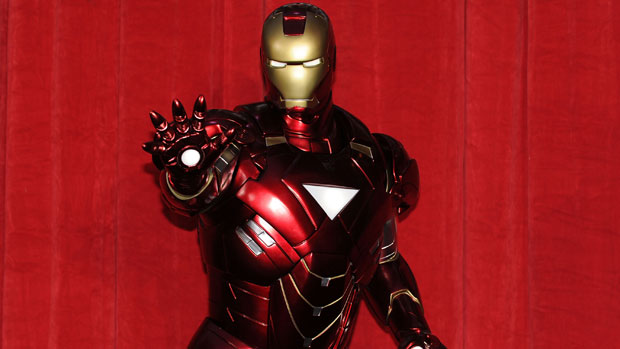Iron Man designers to build body armour for US army
Hollywood special effect team is working on a new Iron Man 'agile exoskeleton' for US soldiers

A free daily email with the biggest news stories of the day – and the best features from TheWeek.com
You are now subscribed
Your newsletter sign-up was successful
The Oscar-nominated special effects team behind the Iron Man suit has been contracted to design body armour for the US military.
Legacy Effects, a Hollywood design studio based in California, has previously worked on power suits for films such as RoboCop, Captain America, The Terminator and Iron Man. Now, the company is building body armour equipped with an "agile exoskeleton" that will allow soldiers to carry hundreds of pounds of equipment, the Wall Street Journal reports.
"We are trying to be revolutionary," said Mike Fieldson, who manages the US military project known as the Tactical Assault Light Operator Suit (Talos).
The Week
Escape your echo chamber. Get the facts behind the news, plus analysis from multiple perspectives.

Sign up for The Week's Free Newsletters
From our morning news briefing to a weekly Good News Newsletter, get the best of The Week delivered directly to your inbox.
From our morning news briefing to a weekly Good News Newsletter, get the best of The Week delivered directly to your inbox.
Three prototypes have been presented to the Pentagon by teams of bioengineers, technologists and a Canadian company that studies insect and animal exoskeletons. The prototypes will contribute to the creation of a new generation of body armour which the US Special Operations Command aims to complete within four years.
The suits are designed to protect soldiers from bullets, explosions and bayonet attacks.
Legacy Effects admits that bringing an Iron Man to life presents significant challenges. For one thing, a real-life version of the suit would add extra bulk to a soldier limiting his or her agility. Also, the company estimates that the Iron Man suit would probably weigh about 180kg, and would need to be supported by a mobile exoskeleton, but "none of the exoskeletons in the industry are capable of moving that much weight", SlashGear reports.
Russ Angold of Ekso Bionics, a company that designs exoskeletons for medical use, says that power armour in films offer an unrealistic model, so engineers are presently trying to make the suits more practical. "Hollywood has definitely made the Iron Man suit impossibly thin, impossibly light, impossibly agile and impossibly energy efficient. So we're really trying to solve the problem and ask the question: What would Iron Man look like if it was real?"
A free daily email with the biggest news stories of the day – and the best features from TheWeek.com
The US military has so far spent about $10 million on Talos, prompting the armed services committee to request a briefing on the project to ensure taxpayer money is not being wasted.
"Will you ever have an Iron Man? I don't know," said Brian Dowling, a former soldier involved in the project. "But you'll have some greatly improved technology along the way".
-
 Political cartoons for February 16
Political cartoons for February 16Cartoons Monday’s political cartoons include President's Day, a valentine from the Epstein files, and more
-
 Regent Hong Kong: a tranquil haven with a prime waterfront spot
Regent Hong Kong: a tranquil haven with a prime waterfront spotThe Week Recommends The trendy hotel recently underwent an extensive two-year revamp
-
 The problem with diagnosing profound autism
The problem with diagnosing profound autismThe Explainer Experts are reconsidering the idea of autism as a spectrum, which could impact diagnoses and policy making for the condition
-
 Epstein files topple law CEO, roil UK government
Epstein files topple law CEO, roil UK governmentSpeed Read Peter Mandelson, Britain’s former ambassador to the US, is caught up in the scandal
-
 Iran and US prepare to meet after skirmishes
Iran and US prepare to meet after skirmishesSpeed Read The incident comes amid heightened tensions in the Middle East
-
 Israel retrieves final hostage’s body from Gaza
Israel retrieves final hostage’s body from GazaSpeed Read The 24-year-old police officer was killed during the initial Hamas attack
-
 China’s Xi targets top general in growing purge
China’s Xi targets top general in growing purgeSpeed Read Zhang Youxia is being investigated over ‘grave violations’ of the law
-
 Panama and Canada are negotiating over a crucial copper mine
Panama and Canada are negotiating over a crucial copper mineIn the Spotlight Panama is set to make a final decision on the mine this summer
-
 Why Greenland’s natural resources are nearly impossible to mine
Why Greenland’s natural resources are nearly impossible to mineThe Explainer The country’s natural landscape makes the task extremely difficult
-
 Iran cuts internet as protests escalate
Iran cuts internet as protests escalateSpeed Reada Government buildings across the country have been set on fire
-
 US nabs ‘shadow’ tanker claimed by Russia
US nabs ‘shadow’ tanker claimed by RussiaSpeed Read The ship was one of two vessels seized by the US military